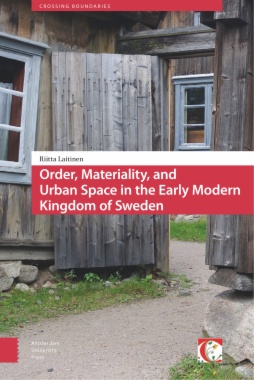Our corporeality and immersion in the material world make us inherently spatial beings, and the fact that we all share everyday experiences in the global physical environment means that community is also spatial by nature. This book explores the relationship between the seventeenth-century townspeople of Turku, Sweden, and their urban surroundings. Riitta Laitinen offers a novel account of civil and social order in this early modern town, highlighting the central importance of materiality and spatiality and breaking down the dichotomy of public versus private life that has dominated traditional studies of the time period.
- Cover
- Table of Contents
- Acknowledgements
- Glossary
- Introduction
- Examining the Town and the Home: Spatial Rules, Spatial Practices and Court Sources
- Spatiality and Materiality
- The Chapters
- Part I – Setting the Stage:
The Kingdom of Sweden and its Towns
- The Swedish Empire and the Province of Finland
- The Swedish Urban System
- The Guild System
- Turku and Its People
- The Laws and the Judicial System
- Part II – Coming, Going and Staying: The Town and the Community
- The Town and Its Space
- 1. Ordering Everyday Mobility
- Marking and Crossing Boundaries
- Stopping at the Toll Gate
- The Extent and the Centre of the Town
- Regulating Burgher Mobility with Detention in Town
- Townspeople on the Move
- Controlling Incoming Strangers
- 2. Undesirable Vagrants – Exclusion or Inclusion?
- ‘Time-thieves’ and Beggars
- Inspecting, Banishing and Housing Vagrants
- Loose or Settled: Sailors and Soldiers and the Town
- Ordering Women in the Margins
- 3. Banishment and Lawbreakers
- Banishment, Law and Crime
- Spatial Exclusion and Rehabilitation of Thieves
- Getting Rid of Miscreants?
- The Banished and the Town
- Community That Banishes
- Part III – Living Together:
Urban Home, Urban Space
- Space and Urban Home
- 1. Organizing Urban Dwelling
- Urban Turku Space: Small Houses and Central Yards
- Household and Holding House
- Tenancy and Control over Space
- The Order and Disorder of Lodging
- The Servants’ Place in Town
- 2. Spatial Rules of the Urban Homes
- Closed and Porous Boundaries
- Violent Invasion of a Home
- Public, Private, and the Protected Home
- Open Homes and Intimacy
- Entering and Exiting: Male Sociability and Transactions
- Conclusions
- Bibliography
- Index
- List of Maps and Illustrations
- Map 1 – Map of seventeenth-century Turku with the toll fence, toll gates and the roads leading from the countryside to the market place
- Map 2 – The surroundings of Turku and the 1530 border of land owned by the town
- Map 3 – The earliest map of Turku is from 1634 and it is based on a survey by Olof Gangius. This copy was moved from Sweden to Finland aroun1809, when the text to the upper right corner was added.
- Illustration 1 – Depiction of seventeenth-century wooden houses in Turku with their yards, based on some archaeological research and written sources

